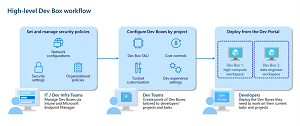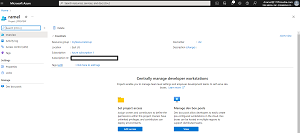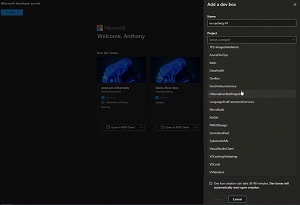News
Microsoft Updates Dev Box Cloud Service for GA in July
At Build 2023, Microsoft revealed updates for Dev Box, a cloud-based developer workstation service.
Microsoft introduced Dev Box in May of last year as a private preview, boosting it into a public preview a few months later. It's an Azure cloud service that gives developers access to ready-to-code, project-specific dev boxes that are preconfigured and centrally managed. They can support hybrid dev teams of any size with high-performance, cloud-based workstations, and let developers focus on writing code by streamlining access to the tools they need, the company said.
 [Click on image for larger view.] Dev Box Workflow (source: Microsoft).
[Click on image for larger view.] Dev Box Workflow (source: Microsoft).
At this week's conference, the company revealed that Dev Box will emerge from preview into production in July. Microsoft also detailed much more activity around the service, including enhancing the development experience within Visual Studio and optimizing the IDE to better use Dev Box. The newly announced features are set to streamline workflows and increase coding efficiency, Microsoft said.
 [Click on image for larger view.] Setting Up a Dev Box (source: Microsoft).
[Click on image for larger view.] Setting Up a Dev Box (source: Microsoft).
One new feature in the works is called Unified Settings, helping developers customize their dev environment setups. "With Unified Settings, you'll be able to easily consume and share all your personal and team Visual Studio settings," Microsoft said in a May 23 blog post. "Not only will the settings roam across your Dev Boxes, making the initial setup a breeze, but they'll also be eligible for sharing and exporting in a human-readable JSON file. This will help simplify how you share or edit settings between installs or amongst your team."
 [Click on image for larger, animated GIF view.] Creating a Dev Box in Animated Action (source: Microsoft).
[Click on image for larger, animated GIF view.] Creating a Dev Box in Animated Action (source: Microsoft).
Here's a list of other Dev Box news and information unveiled at Build 2023.
-
Visual Studio Optimized for Dev Box: Visual Studio 2022, starting with the 17.7 previews, introduces various new features to simplify onboarding and enhance performance, including:
- Pre-built images for Visual Studio 2019 and 2022
- Automatic sign-in to Visual Studio using the associated dev box account
- Git Credential Manager integration with the Web Account Manager in Windows
- Faster performance through pre-generated caches deployed with the dev box
- More Power: Developers can now configure their Dev Box deployments to use higher-powered SKUs to develop and run high-performance, compute and memory intensive workloads. Now generally available are two new SKUs: 16 vCPU 64 GB RAM, and 32 vCPU 128 GB RAM. Also, a 2TB SSD storage option will also be available.
- Hibernate 8 and 16 Core Dev Boxes: To address the issue of paying for unused compute resources, organizations can now hibernate 8- and 16-core dev boxes. This feature ensures that when developers resume their dev boxes, their applications and work are in the same state as they left them, eliminating the need to reopen tools and resources. Admins have the flexibility to schedule hibernations for the end of the day or configure dev boxes to hibernate after a user disconnects, while developers can also choose to skip upcoming hibernations.
- Starter Images: Microsoft has created developer-focused starter images available on the Azure Marketplace, catering to general developers dev infrastructure teams using Visual Studio. These images come with pre-optimized Windows settings, applications and tools, enhancing the overall developer experience. They can be used as-is or serve as a base image for further customization by development teams.
- Config-as-Code Definitions (Private Preview): Recognizing that deploying multiple workstations with custom configurations can burden development infrastructure teams, Microsoft introduced config-as-code capabilities. Developers can customize secure base images provided by IT using YAML configuration files stored in a git repository. Central IT has the flexibility to set up guardrails, curating scripts and software for customization. Interested individuals can sign up for the private preview of this feature here.
More information can be found in the new blog post
About the Author
David Ramel is an editor and writer at Converge 360.